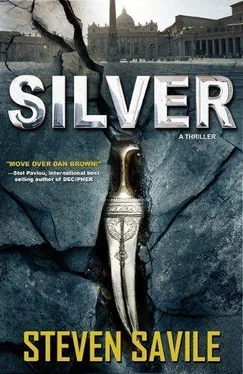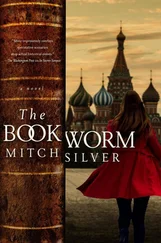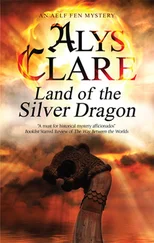Steven Savile - Silver
Здесь есть возможность читать онлайн «Steven Savile - Silver» весь текст электронной книги совершенно бесплатно (целиком полную версию без сокращений). В некоторых случаях можно слушать аудио, скачать через торрент в формате fb2 и присутствует краткое содержание. Жанр: Триллер, на английском языке. Описание произведения, (предисловие) а так же отзывы посетителей доступны на портале библиотеки ЛибКат.
- Название:Silver
- Автор:
- Жанр:
- Год:неизвестен
- ISBN:нет данных
- Рейтинг книги:4 / 5. Голосов: 1
-
Избранное:Добавить в избранное
- Отзывы:
-
Ваша оценка:
- 80
- 1
- 2
- 3
- 4
- 5
Silver: краткое содержание, описание и аннотация
Предлагаем к чтению аннотацию, описание, краткое содержание или предисловие (зависит от того, что написал сам автор книги «Silver»). Если вы не нашли необходимую информацию о книге — напишите в комментариях, мы постараемся отыскать её.
Silver — читать онлайн бесплатно полную книгу (весь текст) целиком
Ниже представлен текст книги, разбитый по страницам. Система сохранения места последней прочитанной страницы, позволяет с удобством читать онлайн бесплатно книгу «Silver», без необходимости каждый раз заново искать на чём Вы остановились. Поставьте закладку, и сможете в любой момент перейти на страницу, на которой закончили чтение.
Интервал:
Закладка:
“Who is he?”
“Mabus,” she said, grateful that the conversation only made sense to the pair of them. She smiled at the woman. It was meant to assure her that everything was fine. She was sure she looked mad.
“Be careful, Orla. Promise me.”
“I’ll be home soon,” she said. It wasn’t the promise he’d wanted, but it was the only one she was prepared to give him. She wasn’t about to be careful. The time for care had passed. She was hunting the man who had made her last few days a living hell. She hung up the phone on him and gave it back to the woman. “Thank you,” she said again. “I can’t pay for the call, I’m sorry. My money is all back at the hotel.”
“That’s okay, honey, don’t worry. Where are you staying?”
She gave them Gavrel Schnur’s address, the big house off the 481, down by the water.
She watched her good Samaritans drive off into the blue sky of the coast road.
Staying in Tel Avivwas counter-intuitive. They would expect her to run, to get as far away from them as she could. Schnur wouldn’t expect her to go to his home and wait for him. It made no logical sense. But revenge wasn’t about logic.
There was no security gate, and no cameras that she could see. That didn’t mean they weren’t there.
She had so many questions. She wanted to ask him to his face why he had done it. Why had he plotted with Solomon and Devere to cause so much pain. She wanted to hear him justify himself? Was he going to blame the murder of his wife? The death of his son? And did it even matter what he said? It could never be justification enough. Hearing it might humanize the toad, but it could never make him human. Nothing could ever do that again.
She walked toward the house.
It was odd that he had never moved, given what had happened to his wife in the driveway, but she reasoned, perhaps he needed the constant reminder to fuel his hatred?
It was the middle of the day, broad daylight, so most likely the toad was at work, or heading to the grocery store basement to finish her. He wouldn’t be home until later. Which would give her time to break in and cover her tracks so that when he finally came home she would be waiting for him.
There wouldn’t be any questions, she decided.
She didn’t want to hear his answers.
The toad didn’t come home for three hours.
It gave her time.
She sat at his desk, breathing in his lingering smell. Everything in the place reeked of Gavrel Schnur. Orla sat back in his high-backed leather chair, wearing one of his wife’s dresses. They were a similar size, if not exactly the same. Schnur had maintained her wardrobes as a shrine. Every garment still hung on its hanger, immaculately pressed. Her death really had affected him. She found a photograph of Dassah and styled her hair so that at first glance the toad might think there was an old ghost in his chair. She went through his things, looking for the name Solomon. She wanted a surname. She wanted a place. Something. Anything. She wanted to link Schnur and Solomon and Devere and work out which one was the idealist, which one the fanatic and which one the opportunist. She assumed it was Solomon, Schnur and Devere, in that order, but she wasn’t about to bet her life on it.
She rifled his drawers and searched the place for a safe. She couldn’t find one, but that didn’t mean the toad didn’t have his hiding places. Everyone had their hiding places. She tried his computer, but it was password protected; and she wasn’t remotely as tech-savvy as Lethe, so she simply pulled the hard drive out of the machine. She’d let Lethe play with it when she got home. She’d tell him it was a coming home present.
Orla swiveled the chair so it turned away from the door. He wouldn’t see her as he came into the room. She sat there alone, waiting. She remembered something he had said in his office. He’d told her that Judas Iscariot wasn’t mentioned anywhere in the Gospel of Peter and asked her what she thought of that. Now, thinking about it, she realized how odd that was. There was Peter, the rock on which the Church was founded, the first Apostle, and he didn’t have a word for the betrayal of his Lord? According to John, Peter was the swordsman who cut off the ear of Malchus when they came to arrest Christ. How could he have not written about Judas, then, if Judas really had been the great betrayer?
Then it occurred to her that perhaps Judas and Peter had in fact been one and the same, that Judas had written the Gospel accredited to Peter. It was a passion, one of the most prominent in early Christianity but denounced as heretical because it blamed Herod Antipas and not Pilate for the crucifixion. The resurrection and the ascension weren’t separate events, either. Where Matthew claimed Christ’s cry from the cross was “Eli, Eli, lama sabachthani?” My god, my god, why hast thou forsaken me? Peter claimed Christ was not calling to God but asking, “My power, my power, why hast thou forsaken me?” and when he had said it he was taken up. There was no death. The other thing she recalled was that there was no disloyalty in Peter’s story. The disciples were arrested for plotting to burn the temple. Could those have been Judas’ thoughts? Judas’ truths?
Peter was the rock the Church was founded upon. Judas’ was the sacrifice the Church was founded upon. Could they be one and the same? Did it even matter, or was Schnur just playing with her, running theosophical rings around her?
The one thing she could understand was that if the Disciples of Judas didn’t believe the words of Matthew, Mark, Luke and John, then there was no need for them to believe in redemption from man’s sins by the suffering on the cross. It was all propaganda and lies, after all, wasn’t it? Made up to sell this new ministry and creling to faith in retrospect. What was it the toad had said? All of these random acts of violence, hate, war and death made him think we weren’t redeemed at all, we were damned. She wondered if he actually believed the stuff he said, or if it was a convenient excuse to strike back at the people he believed had hurt him, the people behind his wife’s murder? Attacking an entire system of faith seemed a little extreme for that.
No, surely in Acts, Peter, Prince of the Apostles, stood up and decried Judas as a traitor? In the same passage he described Judas’ death in gory detail, his guts rupturing in the field of blood as he collapsed. Didn’t the Apostles welcome Matthias in Judas’ place? She could almost hear Schnur’s counter argument in her head: the Gospel of Luke names Jude for Thaddeus; John doesn’t name any of the twelve and adds his own Nathanael. All these testimonies and they can’t keep their key players straight? Peter being described alongside Judas in these other texts and not in his own? Was it revisionist history, trying to erase the sinner from the course of history? Or was it a case of trying to hide something else?
These other gospels were the ones that promised the miracles, the healing of the sick, the driving out demons, even raising the dead. There was nothing like that in Peter’s passion. The story of Akeldama was preposterous, Judas rupturing and exploding was like something out of a bad movie. It’s not even a convincing lie. And of course there were the problems of language. In the original texts the vocabulary was quite limited, meaning that the translations could be very easily made more explicitly divine should the translator wish. For instance, the prepositions on and by were often the same word in Aramaic, which would completely change the whole walking on water thing. Walking by water was far less impressive a feat. So what was Peter hiding? What truth did he not want recorded? If he wasn’t Judas, then perhaps he knew the truth about Judas?
It came back to the word messiah, didn’t it?
Читать дальшеИнтервал:
Закладка:
Похожие книги на «Silver»
Представляем Вашему вниманию похожие книги на «Silver» списком для выбора. Мы отобрали схожую по названию и смыслу литературу в надежде предоставить читателям больше вариантов отыскать новые, интересные, ещё непрочитанные произведения.
Обсуждение, отзывы о книге «Silver» и просто собственные мнения читателей. Оставьте ваши комментарии, напишите, что Вы думаете о произведении, его смысле или главных героях. Укажите что конкретно понравилось, а что нет, и почему Вы так считаете.












